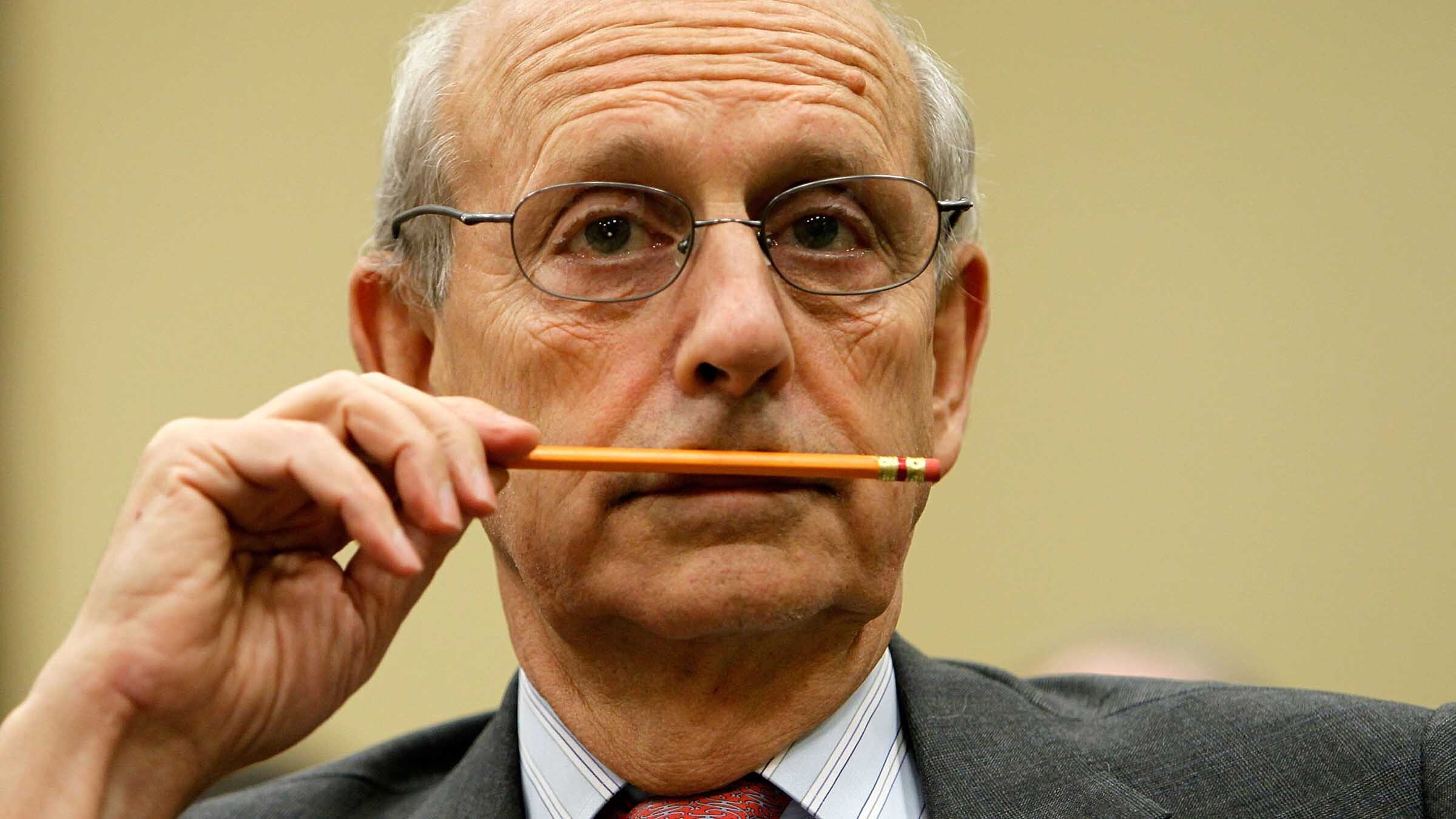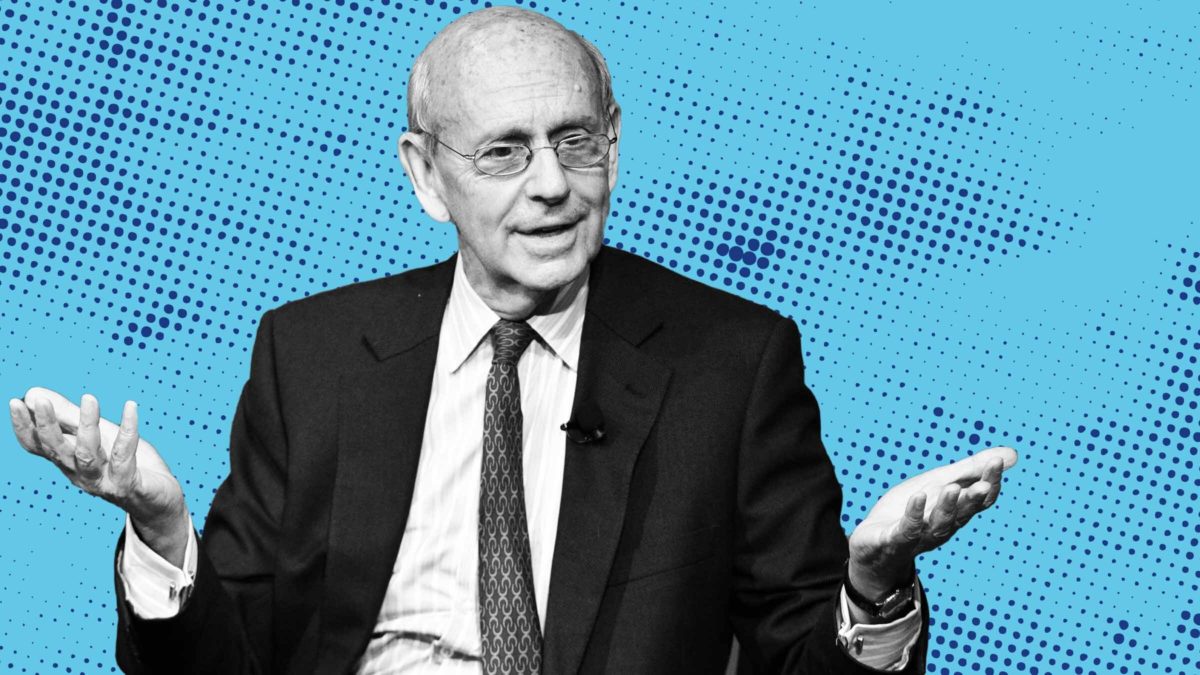Citing his advanced age, many progressives have called for Justice Stephen Breyer to step down from the Supreme Court so that President Joe Biden can nominate his successor during this potentially narrow window of Democratic control of the Senate.The case for the 83-year-old Breyer’s retirement is not only about his longevity, though. Throughout his career as a justice, an appeals court judge, and a legislative staffer, Breyer has helped fuel the modern rise of corporate power.
Although not as reliable a defender of big business privilege as his conservative colleagues, Breyer played a key role in freeing some of the largest players in the airline, banking, and pharmaceutical industries from effective public oversight. This orientation is out of step with Democratic voters, Democratic lawmakers, and a Democratic administration that have signaled their interest in reining in dominant corporations.
A defining achievement of Breyer’s career was the restructuring of the airline industry—commonly referred to today as “deregulation”—in the late 1970s. As counsel to the Senate Judiciary Committee, Breyer helped persuade Massachusetts Senator Edward Kennedy to lead the charge against the Civil Aeronautics Board (CAB) and the public utility rules that had governed the airline industry since the New Deal. This system operated on the assumption that certain characteristics of the airline industry—the large fixed costs of acquiring aircraft, in particular—favored a concentrated market structure with relatively few carriers, making textbook price competition among airlines infeasible. Accordingly, the CAB set airfares and approved routes, contributing to steady reductions in airfares and ensuring service to small and medium-sized cities and towns. Breyer opposed the CAB system, in part, because he believed regulators limited price competition among airlines to the detriment of the flying public.
Breyer’s view quickly proved to be wrong. Following the restructuring of the industry, major carriers pursued monopolization and consolidation with vigor. With increasing frequency, they moved from point-to-point travel (New York to Los Angeles direct) to hub-and-spoke service (those New York to Los Angeles via Minneapolis itineraries we all love to hate). Airlines also built up “fortress hubs” that they dominate, such as the Delta-heavy Hartsfield-Jackson International Airport in Atlanta, to facilitate this new model.
Restructuring also produced a turbulent market. After years of price wars, bankruptcies, and federal bailouts, the industry only achieved some stability after a series of mergers and acquisitions that gave the top four carriers a combined domestic market share of greater than 60 percent. More than 40 years after restructuring, rather than being managed by a publicly-accountable body like the CAB, the industry is an oligopoly controlled by the directors and executives of a few big airlines.
As a result, airline restructuring arguably has not even succeeded on its own terms of offering lower fares for flyers. Instead, after controlling for reduction in service quality, airfares have increased at a faster rate than overall inflation since the late 1970s. Post-restructuring, airlines also adopted complicated, opaque pricing structures in which fares can vary widely from passenger to passenger on the same flight for the same level of service, as anyone who has searched for a flight online over a few days or even hours can attest. And this limited accounting does not consider the elimination of air service to many towns and cities and the substantial decline in wages for airline workers since the 1970s. Breyer’s fingerprints are all over a system that has inflicted substantial harm on flyers, workers, and communities.

Breyer also played a central role in reinterpreting and weakening antitrust rules governing large corporations. William Kovacic, a former chairman of the Federal Trade Commission (FTC), has argued that Breyer shares the blame for the retrenchment of antitrust law over the past 40 years, noting that he “pushed important elements of antitrust doctrine in permissive directions” away from strict postwar restrictions on corporate conduct.
In 1980, President Jimmy Carter appointed Breyer to serve as a judge on the U.S. Court of Appeals for the First Circuit; he was elevated to the position of Chief Judge in 1990. In a 1983 decision called Barry Wright v. ITT Grinnell, Breyer granted corporations greater freedom to use below-cost prices to marginalize rivals and acquire or maintain market dominance—a tactic called predatory pricing. His decision laid the groundwork for the Supreme Court’s subsequent lifting of antitrust restrictions on the practice. These rulings, by broadly legalizing predatory pricing, today authorize corporations like Amazon and Uber to deliberately run losses in an attempt to take over markets or to maintain their dominance.
Later on, Breyer presided over an appeal in a municipal utility’s monopolization suit against a large investor-owned utility. In his opinion in Town of Concord v. Boston Edison Company, Judge Breyer reasoned that public utility regulators could be relied on to police the conduct of power companies, and that this oversight should displace the protections of antitrust law. Whereas Breyer believed that airline regulators were beholden to carriers and failed to protect the public from unjustifiably high airfares, he dismissed the need for antitrust law to serve as a backstop against captured or lethargic utility regulators. When President Bill Clinton nominated Breyer to the Supreme Court in 1994, a respected antitrust attorney bluntly described then-Judge Breyer as having “a brooding concern for the rights of monopolists.”
A new, younger, more progressive justice would also almost certainly be a substantive improvement over Breyer on critical questions of antitrust enforcement and corporate power.
In his 27-year tenure on the Court, Breyer has too often protected big business privilege from antitrust lawsuits. In 2007, the Court, in an opinion authored by Breyer, held that collusive marketing practices among investment banks cannot be challenged in antitrust litigation. Even though Congress, in the Securities Act and Securities Exchange Act, preserved the application of the antitrust laws in the securities industry, Breyer reasoned that the Securities and Exchange Commission’s review and oversight was sufficient to protect investors. Once again, he deferred to a regulatory body and believed a federal agency diligently policed the behavior of Wall Street banks. Given that a global financial crisis caused in no small part by regulatory complacency occurred the following year, Breyer’s faith was not well-placed.
Similarly, in a 2013 decision for a five-justice majority, Breyer gave brand-name pharmaceutical companies substantial latitude to pay generic manufacturers to postpone their entry into the market. These “pay-for-delay” agreements impose billions of dollars in annual excess prescription drug expenses on patients and payors like Medicare. Even though the Court has long condemned price-fixing and other collusive conduct among rivals, Breyer’s decision held that pay-for-delay collusion among big-name drug companies and generic competitors should not be categorically illegal, and instead should be evaluated on a case-by-case basis. His opinion cited some highly implausible justifications for enabling this form of collusion: For instance, he asserted that branded drug companies might work with generic companies on marketing campaigns, even though generic manufacturers generally eschew advertising and try to compete on lower prices instead.
Breyer has also joined several pro-monopoly opinions as a justice. Most notably, he signed on to Justice Antonin Scalia’s majority opinion in a 2004 decision, Verizon v. Trinko, that heaped praise on the supposed benefits of monopolies. “The opportunity to charge monopoly prices—at least for a short period—is what attracts ‘business acumen’ in the first place; it induces risk taking that produces innovation and economic growth,” Scalia wrote, noting in a seemingly grudging concession that “the benefits of antitrust are worth its sometimes considerable disadvantages.” In June 2021, a federal judge relied heavily on Trinko to dismiss the FTC’s complaint alleging that Facebook monopolized the social network market. Even if Facebook were a monopolist, he concluded, the company under Trinko has no general duty to interoperate with rival services, and had broad latitude to prevent competitors, such as video-sharing app Vine, from reaching Facebook users.
The basic critique of Breyer’s decision to remain on the Court is about math: He is putting the three-justice liberal wing in danger of getting even smaller. But a new, younger, more progressive justice would also almost certainly be a substantive improvement over Breyer on critical questions of antitrust enforcement and corporate power, particularly at a moment when large corporations and their executives and controlling shareholders are wealthier and more powerful than ever.
In a July speech announcing his administration’s commitment to more robust antimonopoly actions, President Biden said that U.S. antitrust officials and judges had chosen “the wrong path” by “following the misguided philosophy of people like Robert Bork.” If Biden had wished to expand the list of culprits in the spirit of candor, he could have justifiably added Stephen Breyer’s name to the list.

